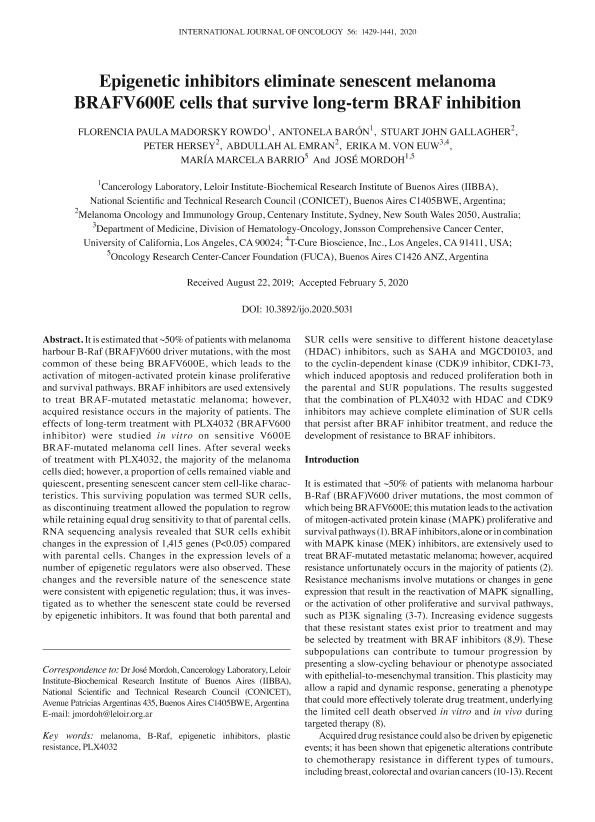Artículo
Epigenetic inhibitors eliminate senescent melanoma BRAFV600E cells that survive long-term BRAF inhibition
Madorsky Rowdo, Florencia Paula ; Baron, Antonela
; Baron, Antonela ; Gallagher, Stuart John; Hersey, Peter; Emran, Abdullah A. L.; Von Euw, Erika María
; Gallagher, Stuart John; Hersey, Peter; Emran, Abdullah A. L.; Von Euw, Erika María ; Barrio, Maria Marcela
; Barrio, Maria Marcela ; Mordoh, Jose
; Mordoh, Jose
 ; Baron, Antonela
; Baron, Antonela ; Gallagher, Stuart John; Hersey, Peter; Emran, Abdullah A. L.; Von Euw, Erika María
; Gallagher, Stuart John; Hersey, Peter; Emran, Abdullah A. L.; Von Euw, Erika María ; Barrio, Maria Marcela
; Barrio, Maria Marcela ; Mordoh, Jose
; Mordoh, Jose
Fecha de publicación:
06/2020
Editorial:
Spandidos Publications
Revista:
International Journal of Oncology
ISSN:
1019-6439
e-ISSN:
1019-6439
Idioma:
Inglés
Tipo de recurso:
Artículo publicado
Clasificación temática:
Resumen
It is estimated that ~50% of patients with melanoma harbour B-Raf (BRAF)V600 driver mutations, with the most common of these being BRAFV600E, which leads to the activation of mitogen-activated protein kinase proliferative and survival pathways. BRAF inhibitors are used extensively to treat BRAF-mutated metastatic melanoma; however, acquired resistance occurs in the majority of patients. The effects of long-term treatment with PLX4032 (BRAFV600 inhibitor) were studied in vitro on sensitive V600E BRAF-mutated melanoma cell lines. After several weeks of treatment with PLX4032, the majority of the melanoma cells died; however, a proportion of cells remained viable and quiescent, presenting senescent cancer stem cell-like characteristics. This surviving population was termed SUR cells, as discontinuing treatment allowed the population to regrow while retaining equal drug sensitivity to that of parental cells. RNA sequencing analysis revealed that SUR cells exhibit changes in the expression of 1,415 genes (P<0.05) compared with parental cells. Changes in the expression levels of a number of epigenetic regulators were also observed. These changes and the reversible nature of the senescence state were consistent with epigenetic regulation; thus, it was investigated as to whether the senescent state could be reversed by epigenetic inhibitors. It was found that both parental and SUR cells were sensitive to different histone deacetylase (HDAC) inhibitors, such as SAHA and MGCD0103, and to the cyclin-dependent kinase (CDK)9 inhibitor, CDKI-73, which induced apoptosis and reduced proliferation both in the parental and SUR populations. The results suggested that the combination of PLX4032 with HDAC and CDK9 inhibitors may achieve complete elimination of SUR cells that persist after BRAF inhibitor treatment, and reduce the development of resistance to BRAF inhibitors.
Palabras clave:
B-RAF
,
EPIGENETIC INHIBITORS
,
MELANOMA
,
PLASTIC RESISTANCE
,
PLX4032
Archivos asociados
Licencia
Identificadores
Colecciones
Articulos(IIBBA)
Articulos de INST.DE INVEST.BIOQUIMICAS DE BS.AS(I)
Articulos de INST.DE INVEST.BIOQUIMICAS DE BS.AS(I)
Articulos(SEDE CENTRAL)
Articulos de SEDE CENTRAL
Articulos de SEDE CENTRAL
Citación
Madorsky Rowdo, Florencia Paula; Baron, Antonela; Gallagher, Stuart John; Hersey, Peter; Emran, Abdullah A. L.; et al.; Epigenetic inhibitors eliminate senescent melanoma BRAFV600E cells that survive long-term BRAF inhibition; Spandidos Publications; International Journal of Oncology; 56; 6; 6-2020; 1429-1441
Compartir
Altmétricas



